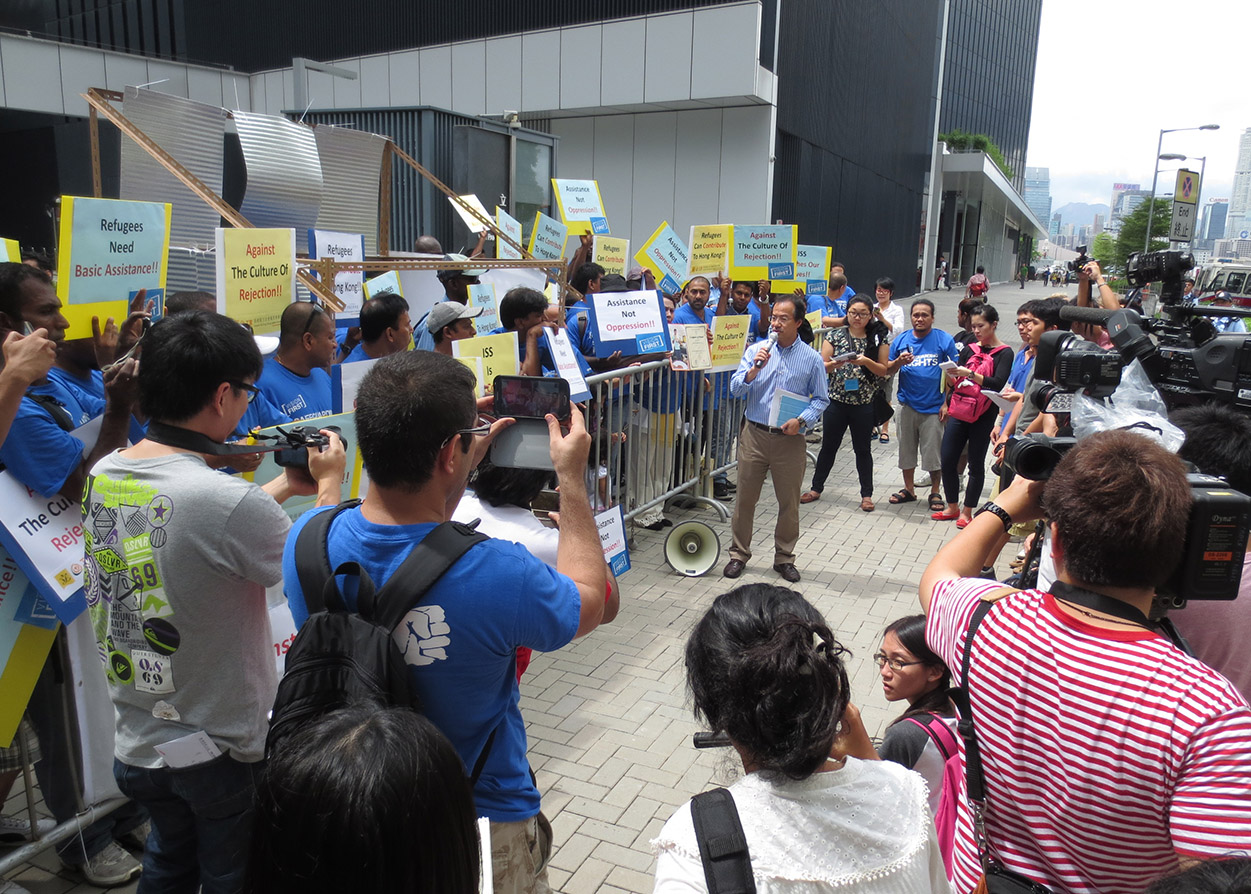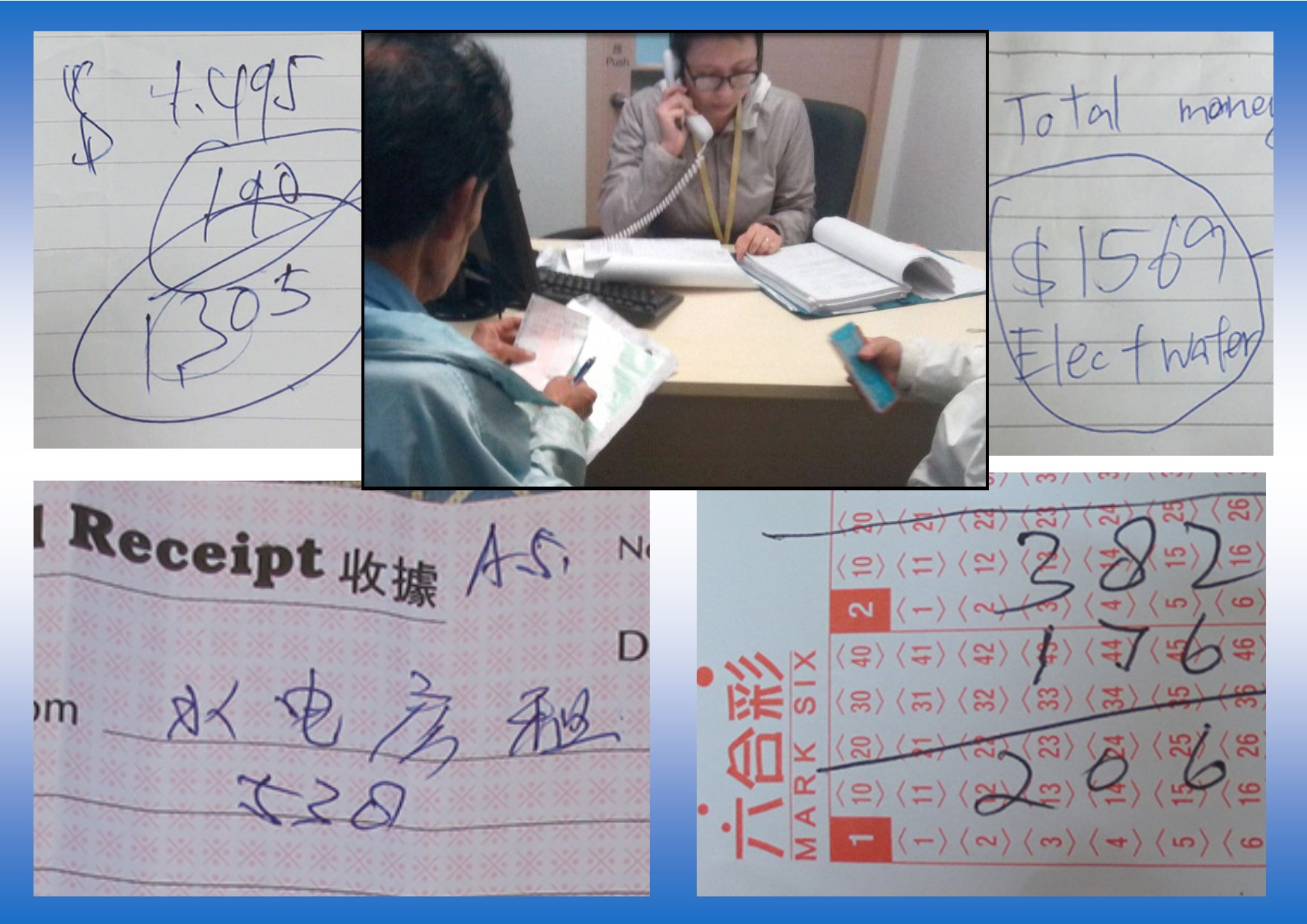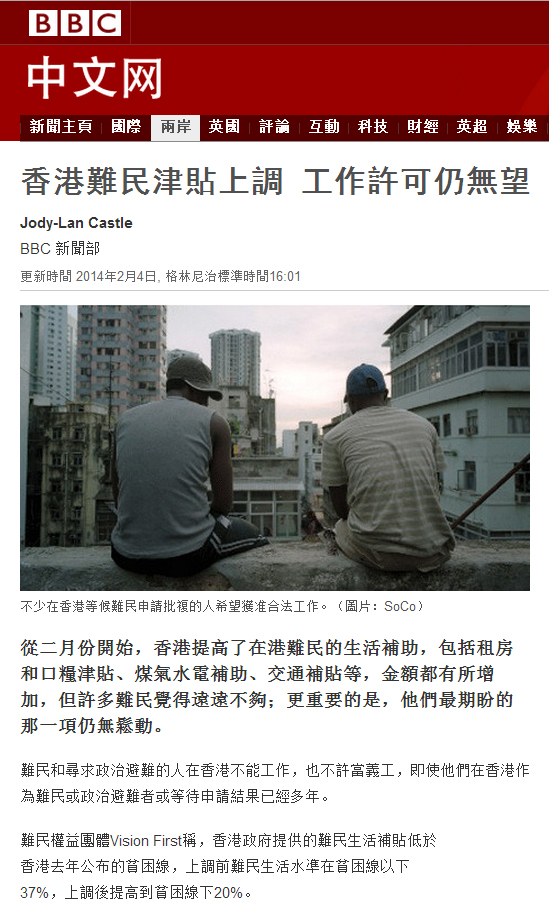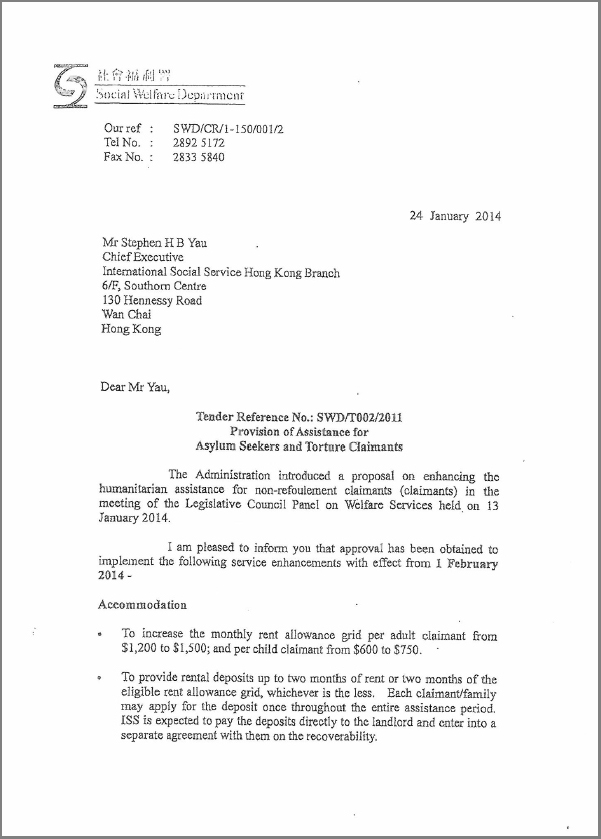Archive
SWD enhances levels of assistance for refugees
Jan 30th, 2014 | Food, Government, Housing, Welfare | Comment
Hong Kong needs a reception strategy for refugees
Jan 16th, 2014 | Advocacy | Comment
New refugee arrivals are processed by the Immigration Department’s General Investigation Section that confirms identity and determines release on recognizance. After tourist visas expires, persecution claimants may surrender at police stations, or directly to the Immigration Department in Kowloon Bay. They often do this after filing a refugee claim at UNHCR, though this channel will soon close.
Until recently, new claimants were sent to the Castle Peak Bay Immigration Centre for clearance, while only the sick, the pregnant and families were released on recognizance on the same day. Although detention is an unsettling prospect, refugees knew that within a month or two they would be released with Recognizance Forms (immigration papers) entitling them to SWD welfare services.
Vision First is gravely concerned that during these cold winter weeks, Immigration appears to be unable to process new claimants expeditiously. There have been numerous cases in which new arrivals, who launched protection claims, were asked to return to Immigration for registration a week later. In such incidents they risked arrest by the police as overstayers, despite having attempted to surrender. One African refugee asked Immigration what would happen and was told, “That is your problem!”
At issue is not the processing time of new applications, but how destitute human beings should survive without assistance in an unwelcoming environment. Recently several incidents occurred in which new claimants applied for protection and were told to return the following week, their passports having been retained and an appointment slips issued. However, they were not provided with Recognizance Forms and consequently could not access welfare services, despite being indigent.
Among these, one African refugee informed Immigration that he had no money and nowhere to stay. He was shocked when the officer sneered, “You go sleep in the streets at the Star Ferry and come back next Wednesday”. Another South Asian claimant was asked for his address and replied, “Outside, at the Star Ferry in TST”. He couldn’t believe his eyes when the officer wrote “ISS” in the address field.
It is outrageous that pushing refugees to sleep in the street and lying in their forms is part of Hong Kong’s policy for receiving new protection claims. Although indicative of systemic malaise, the lack of a comprehensive Reception Strategy is the most shameful part of this failed asylum policy. First impressions count and, being on the front line, Vision First assures that, from day one, our city fails to impress newly arrived refugees.
Forcing people to sleep under the cold winter sky leads to sickness that ultimately costs the government more than cheap guesthouse rooms. Until a government-run Refugee Hostel is opened, it is unconstitutional for the Immigration and Social Welfare Departments to ignore the plight of refugees who, by law, should not be left homeless in a state of destitution. It might be the case that damage claims should be launched against authorities to highlight and remedy this unacceptable negligence.
Vision First urges the government to deploy a comprehensive Reception Strategy for new arrivals. The Immigration Department must refrain from kicking people indifferently into the street – particularly those who recently suffered unspeakable tragedy. This is not a humanitarian issue, but one of the government’s mandatory duty to ensure that refugees – new arrivals or not – are not homeless and hungry. No excuse can be made for failing to provide basic asylum support to persecuted foreigners.

Vision First helps those who help themselves
Jan 10th, 2014 | Advocacy, Personal Experiences | Comment
Hi to all Refugees –
If some Refugees work illegally – it is the Government’s fault!
If some Refugees become criminals – it is the Government’s fault!
If some Refugees are drug-trafficking – it is also the Government’s fault!
I say it is the Government’s fault, because it is their duty to care for refugees here.
We all know the fact: WE CANNOT WORK and we cannot join a business.
This totally means that Refugees can’t do anything for themselves or their future.
We are stuck between Hong Kong and the Social Welfare Department.
My point is this: if on 13 January we don’t support each other, we will be stuck again!
We will keep suffering and the Government will be even happier to play with us.
Everyone must learn about their rights and come and fight for their rights.
We will fight together! Remember that one hand doesn’t make any sound.
See you at the PROTEST RALLY at the Legislative Council, on Monday 13 January at 10am.
Raymond
VF STARTS 2014 WITH THE LEGCO PROTEST.
VF COMMITS TO HELPING THE PROTESTERS.
IF YOU WANT ASSISTANCE, SHOW YOUR SUPPORT.
VF HELPS THOSE WHO HELP THEMSELVES.
COME FIGHT FOR YOUR RIGHTS!

Vision First organized refugees for the first LegCo welfare meeting on 22 July 2013
ISS returns to 3 times food distribution
Jan 9th, 2014 | Advocacy, Food, Welfare | Comment
On 24 September 2013, Vision First assisted 80 refugees in a demonstration outside the ISS office in Tsuen Wan. The police took the event seriously and outnumbered protesters two-to-one, as if they expected trouble. This was not the first time the government belatedly confronted a social problem that could have been easily avoided. Read the blog, “Refugees protest food abuse at ISS-HK Tsuen Wan“
It was discontent with food provisions that drove refugees to complaint. The trigger point was not the quantity or quality of food – issues they have put up with for years – but the alteration of collections from 3 to 6 times a month. In itself that wasn’t a drama. The problem was that ISS claimed the change was necessary to supply fresher fruit and vegetables, which turned out to be untrue.
Instead, refugees realized they were being cheated: the bags of groceries were significantly lighter than before. People became suspicious. They made lists and took photos. Angry refugees refused to be treated like beggars. Not only were the grocery packages smaller, but the diminished amounts left them hungry. There was growing evidence of a sinister manipulation of food supplies. What was really going on?
It was crystal clear ISS had engineered the change to conceal a reduction. Vision First denounced this senseless harassment of refugees who – not being allowed to work – risked jail for working to buy food. We urged authorities to investigate the quantity, quality and distribution system as organized by ISS through seven dedicated shops. More analysis on the 53 million dollar food contract and the ‘Vanish Food Magic Trick’ is available here.
The South China Morning Post reported that, “Each claimant will be entitled to HK$1,200 worth of food a month, up by HK$140. And the allowance for basic utilities will rise by HK$30 to HK$300 per head.” Hold on a moment. The current utility allowance is 190$, so clarifications are in order. As for the food value, it matters not what the SWD pays ISS, but what ISS supplies to refugees!
The enhancement will only be trusted if refugees collect 1200$ of groceries a month – at wholesale prices – without shifty cuts, reductions or losses. Anything less points to fraudulent practices in the distribution chain and should be of grave concern to authorities. Vision First will keep vigilant: we will count and value and monitor the system to ensure transparency.
On 24 September 2013, we had no illusions of changing the system. Any fight for social justice is an arduous one, particularly on behalf of non-citizens. It is with great satisfaction that we received, unconfirmed, news that ISS will revert to 3 times food distribution in February. Staff in the seven shops have already informed many refugees. It has taken four months for that protest action – and several blogs – to bear fruit, but it is mission accomplished.
Refugees are learning that public demonstrations have the power to change their destiny.

Scrapping the Asylum Games in the City of Refuge
Jan 8th, 2014 | Advocacy | Comment
Last week the Immigration Department released figures concerning protection claimants for the first eleven months of 2013: there were 474 new claims between January and November. This is the lowest total since 2000 and remarkable compared to a record 3286 claims in the whole of 2009. An 85 per-cent drop is significant even accounting for delays in filing (12-months according to ImmD) and the impact of a right-to-work judgment in early 2009.
The hardline Guardians of the City of Refuge are undoubtedly celebrating this victory. Hong Kong welcomed 2.5 million refugees in the Twentieth Century before the gates of asylum slammed shut. Conversely, in the last decade an intransigent message was dispatched to lands of persecution, “Make no mistake – We will send you back and make life hell until you leave!” The Guardians then devised a master plan to achieve their goal.
The Guardians first implemented policies to discourage asylum seeking. They then set rules for a filtering process, for the survival of the fittest, or the persecuted, in this case. To appear to comply with the rule of law, masterminds coated unconstitutional practices with a veneer of decency. Control of both enforcement and welfare services ensured undisputed domination of the field.
There were no posters or press releases to announce The Asylum Games. The rules were not formulated piecemeal – as one is lead to believe – but determined by a ruthless strategy to divide and conquer. Like in any great magic trick, players are played without realizing it. They face the odds of bulls dodging matadors, with the difference that bulls fight for their life.
Restrictions imposed on asylum are a clear indication of an unwillingness to grant it.
In the summer of 2004 the Asylum Games were quietly opened after the Guardians were soundly defeated by the Prabakar Judgment. They unanimously agreed that high standards of fairness were indeed necessary to safeguard the interests of stakeholders, namely, the Guardians of prosperity. How preposterous to suggest pesky refugees should be treated fairly for contributing nothing!
Vision First coined the expression ‘culture of rejection’ to denote covert hostility towards asylum in a city that should theoretically grants refuge. It illustrates a dislocation between the reality in the street and promises enshrined in law. It helps to explains the paradox of offering asylum, while disallowing it. The ‘culture of rejection’ becomes the game theory behind the undeclared rules of the Asylum Games:
- Zero winners (to discourage applications and illusions of winning)
- No announcement of winners (to maintain a psychological advantage)
- Low entry requirements (to avoid unregistered players)
- Insignificant assistance (to ensure use of own resources)
- Limited emergency support (to starve players of official resources)
- Minimal private aid (to offer the illusion of fair play)
- Arrests through entrapment (to increase stress and instill fear)
- Long prison sentences (to knock out players and encourage withdrawal)
- Antagonistic biased referees (to guarantee one-sided fairness)
- Voluntary departures (to hide forced removal of players)
- Manipulative propaganda (to ensure a crushing home advantage)
- Negative overseas promotion (to deter interest and participation)
For the Guardians, the Asylum Games have been a resounding success. The zero winners rule has been a technical win for twenty-one years. The Guardians dominated the field with undisputed control, notwithstanding disruptions by raucous supporters in the Human Rights Corner. By enforcing harsh and uncompromising rules, the Guardians might achieve their ultimate goal – scrapping of the Asylum Games altogether.

Stop blackmailing refugees with fraudulent bills
Jan 7th, 2014 | Advocacy | Comment
Refugees denounce the exploitation by landlords through fraudulent electricity bills. With few exceptions, urban and slum landlords earn illegal profits from electricity bills. Unsatisfied with extortionary rents, every month owners extort several hundred dollars from each refugee. This practice forces tenants to work and risk 15 months imprisonment to pay dishonest bills.
While it is legal to have qualified electricians install meters (the emphasis is on qualified), it is illegal to claim more than what is charged on the underlying electricity bills. If landlords fail to produce copies of power companies’ debit notes and proceed to charge more than the underlying invoice, they commit an offense under the Theft Ordinance (Cap 201).
This abuse is the third worse strain on persecuted foreigners beside rent and food shortfalls. With 4000 refugees illegally charged a minimum 200$ a month, this amounts to a 10 million dollar yearly racket! It is widely known that landlords blackmail fearful tenants to cough up the money under threat of throwing them in the street, “Money, money … or zau la!” (走喇 “Leave”)
Landlords blackmail refugees with fraudulent electricity bills.
In 2013 Vision First visited hundreds of homes and only two landlords readily provided photocopies of electricity bills when presenting monthly notices. Refugees call on authorities to investigate and stop this widespread cheating and blackmailing. These practices force destitute foreigners to break the law in desperation. They have no choice but to work to pay such bills.
This shameful situation raises questions about the professionalism of ISS case workers. They are the controllers who ought to monitor utility statements prior to authorizing payment of tax dollars to deceitful landlords. Handwritten demand notices are scribbled on scraps of paper – sometimes Mark Six forms – handed out with the uncompromising warning, “Pay or leave!”
Under section 17 of the Theft Ordinance, it is written that: “Any person who by any deception, dishonestly obtains property belonging to another, with the intention of permanently depriving the other of it, shall be guilty of an offence and shall be liable on conviction upon indictment to imprisonment for 10 years.”
Vision First encourages refugees to report to the police fraudulent payment demands. They should state the name of ISS case workers who fail or refuse to protect them by accepting coercive notices. As such, they acquiesce to this abuse and exploitation. Refugees are deeply concerned that ISS does nothing to stop landlords from submitting false or misleading statements.
It is clear that this situation is unacceptable. ISS and SWD stand in a position of trust towards refugees. By allowing refugee to be blackmailed by dishonest landlords, both ISS and SWD are in breach of their fiduciary duties and must be held accountable. Vision First urges the Social Welfare Department to demand copies of electricity bills prior to disbursing government funds.
Refugees demand transparency and accountability in welfare services.

ISS case worker Felicity Wong accepts electricity bills penned on Mark Six tickets



